Stadium Type

How does the type of sport influence the design of a sports stadium ?
The type of sport played in a stadium significantly influences its design, with each sport having unique requirements and considerations. The size and layout of the stadium must accommodate the specific dimensions needed for the sport, such as a larger soccer field compared to a basketball court. The seating capacity is also influenced by the popularity of the sport, with larger stadiums often required for sports with large fan bases. Facilities and amenities within the stadium are tailored to the sport, including specialized equipment or technology like scoreboards for sports that require them. Acoustics play a role in some sports, with quiet environments necessary for tennis matches and louder environments for football games. Safety and security measures are also tailored to the sport, with additional padding or barriers needed for contact sports and extra security measures for sports that attract rowdy fans. In conclusion, the design of a sports stadium is heavily influenced by the type of sport being played, requiring unique considerations for each sport's needs in terms of size, layout, facilities, acoustics, and safety.

What are some innovative features that can be included in modern sports stadium design ?
Innovative features in modern sports stadium design include sustainable construction, advanced technology, enhanced fan experience, safety and security measures, flexible design, and environmentally conscious facilities. These features aim to improve the fan experience, increase sustainability, and ensure the safety of attendees.

What is the importance of lighting in sports stadium design ?
Lighting plays a crucial role in the design of sports stadiums, ensuring safety and visibility for athletes and enhancing the overall experience for spectators. Proper lighting allows athletes to clearly see the playing field and make accurate judgments about distance, speed, and direction, leading to better performance. Well-designed lighting systems also minimize glare and reflections, reducing eye strain for spectators and providing an enjoyable viewing experience. Energy efficiency and cost savings are important considerations in sports stadium lighting design. LED lighting technology consumes less energy compared to traditional lighting sources and has a longer lifespan, reducing maintenance costs and frequency of replacement. Smart lighting systems can adjust brightness levels based on natural light availability and be controlled remotely, further reducing energy consumption. Lighting also plays a role in creating atmosphere and ambiance within sports stadiums. Different colors of lighting can evoke different emotions among spectators, creating a unique atmosphere for each event. Customized lighting schemes can be used to promote team colors or sponsor logos, enhancing brand recognition. Advanced lighting systems can create dynamic light shows during halftime or between events, adding excitement and entertainment value. Interactive lighting features can engage spectators and create a sense of community within the stadium. In conclusion, lighting is a vital aspect of sports stadium design that ensures safety and visibility, promotes energy efficiency and cost savings, and enhances the overall atmosphere and ambiance of the event. As technology continues to advance, it is essential for stadium designers to stay updated with the latest trends and innovations in lighting systems to provide the best possible experience for both athletes and spectators alike.
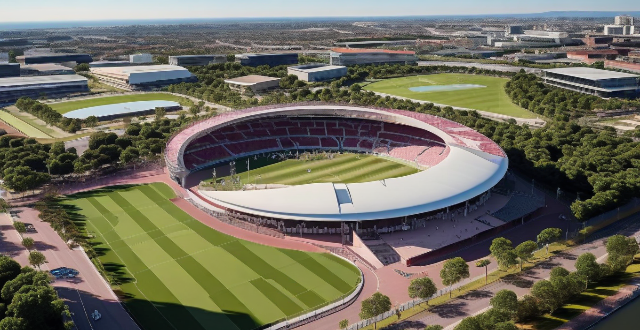
How can a sports stadium be designed to enhance fan engagement and experience ?
Designing a sports stadium to enhance fan engagement and experience requires careful consideration of various factors. These include seating arrangements, technology integration, amenities, and more. Key strategies for designing an engaging stadium involve creating premium seating options near the field, ensuring good viewing angles, providing comfortable seating, offering strong Wi-Fi connectivity, developing mobile apps, installing large screen displays, integrating interactive features, offering a variety of food and beverage options, ensuring ample restroom facilities, creating merchandise stores, designating family-friendly areas, using music and lighting effects to create an energetic atmosphere, encouraging fan interaction through contests and giveaways, and planning themed events around holidays or special occasions. By prioritizing these factors, you can ensure that your sports stadium becomes a destination for sports enthusiasts seeking an exceptional experience.
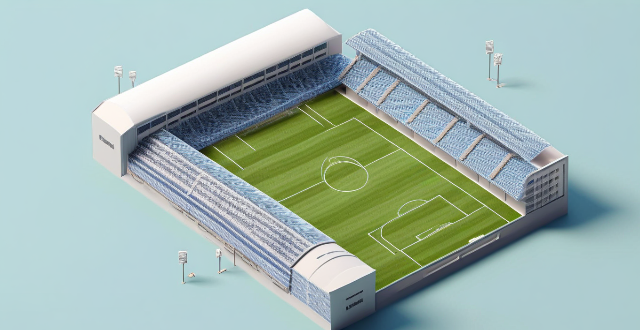
What role does technology play in the design of a sports stadium ?
Technology has revolutionized the design of sports stadiums, enhancing fan experience with interactive displays, mobile apps, and augmented reality. It also improves functionality and safety through advanced lighting systems, security cameras, and smart building management systems. As technology evolves, we can expect more innovative solutions that will further transform the way we enjoy sports events.
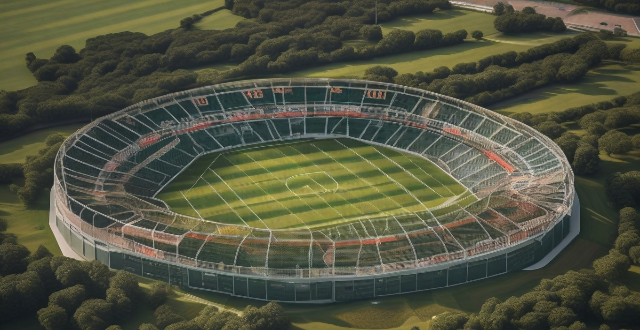
Where will the next Summer Olympics football tournament be held ?
The next Summer Olympics football tournament will take place in Tokyo, Japan from July 23 to August 8, 2021. The matches will be played at several stadiums across Japan, including Saitama Stadium, Sapporo Dome, International Stadium Yokohama, Nippon Gaishi Stadium, and Kashima Soccer Stadium. There will be 16 men's national teams and 12 women's national teams competing for gold medals in their respective categories. Due to the COVID-19 pandemic, there have been some changes to the schedule and format of the tournament, including limited spectators, staggered scheduling, and regular testing for all participants.
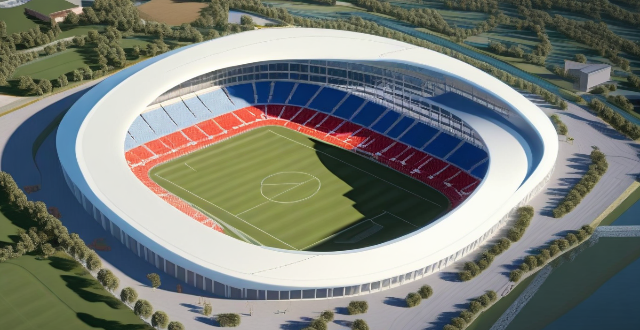
What are the key factors to consider when designing a sports stadium ?
When designing a sports stadium, several key factors must be considered to ensure its success and functionality. These include location and accessibility, capacity and seating arrangement, facilities and amenities, technology and infrastructure, and environmental sustainability. The stadium should be easily accessible by public transportation and have adequate parking spaces. It should also have clear pedestrian access points and designated areas for disabled spectators. The size of the stadium should match the expected number of spectators, and the seating layout should provide good sightlines and comfortable viewing angles. Concessions, restrooms, first aid stations, and security measures should also be taken into account. Modern technology like scoreboards, Wi-Fi connectivity, and sound systems are essential for enhancing the fan experience. Finally, environmental sustainability features such as energy efficiency, water conservation, and waste management systems should be incorporated into the design to minimize the stadium's impact on the environment.
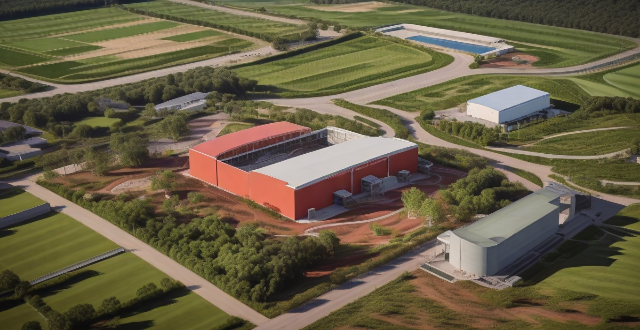
What is the connection between deforestation for stadium construction and increased greenhouse gas emissions ?
Deforestation for stadium construction leads to increased greenhouse gas emissions by reducing carbon sinks, disturbing soil, consuming energy during construction and operation, altering albedo, increasing transportation-related emissions, generating waste, affecting biodiversity, and changing water regulation. Mitigation strategies include sustainable design, using renewable energy, promoting public transportation, carbon offsetting, and effective waste management.

How does exercise impact the prevention and management of type 2 diabetes ?
Exercise is important to prevent and manage type 2 diabetes. It improves insulin sensitivity, reduces blood sugar levels, and promotes weight loss. Regular physical activity can help prevent type 2 diabetes by improving the body's ability to use glucose for energy and reducing visceral fat. To prevent type 2 diabetes, adults should aim for at least 150 minutes of moderate-intensity aerobic exercise per week or 75 minutes of vigorous-intensity aerobic exercise per week. For managing type 2 diabetes, it is recommended that people engage in at least 150 minutes of moderate-intensity aerobic exercise per week or 75 minutes of vigorous-intensity aerobic exercise per week. Strength training exercises should also be included at least twice per week.
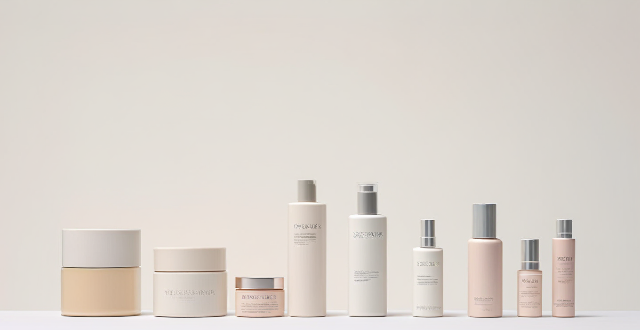
How do I choose the right makeup products for my skin type ?
The text provides a comprehensive guide on how to choose the right makeup products for different skin types. It starts by explaining the characteristics of each skin type and then suggests suitable makeup products based on these characteristics. For normal skin, lightweight and breathable formulas are recommended; for dry skin, hydrating products like rich moisturizers and liquid or cream foundations are suggested; oily skin should opt for oil-controlling primers and mattifying foundations; combination skin requires customization with balanced formulas; and sensitive skin should look for hypoallergenic and fragrance-free products with soothing ingredients. Additionally, the text offers general tips applicable to all skin types such as using sunscreen, gentle cleansers, and allowing each product to absorb before applying the next one. Overall, the guide emphasizes the importance of understanding your skin type to select makeup products that cater to its specific needs and enhance natural beauty.
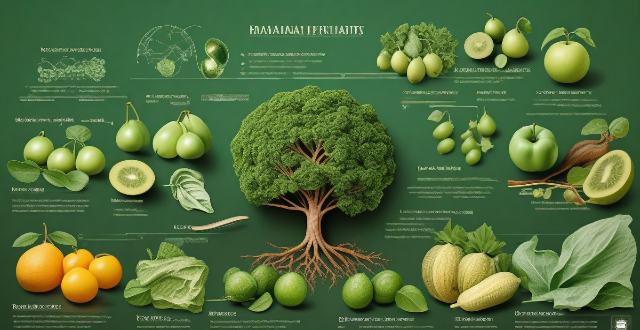
What is the difference between a Roth IRA and a traditional IRA ?
The article discusses the differences between Roth IRAs and traditional IRAs, focusing on aspects such as tax treatment, contribution limits, early withdrawal penalties, required minimum distributions (RMDs), rollover rules, and estate planning considerations. It emphasizes that each type of IRA has its own unique set of rules, benefits, and drawbacks, and suggests consulting with a financial advisor to determine which type aligns best with individual retirement goals and financial strategy.

What are some examples of sustainable sports facilities ?
Sustainable sports facilities prioritize environmental responsibility, incorporating features like renewable energy sources and water conservation techniques. Examples include the Bird's Nest Stadium in Beijing, Emirates Stadium in London, Olympic Aquatics Centre in London, Mercedes-Benz Arena in Berlin, and Allianz Field in Minnesota. These facilities demonstrate how sustainability can be integrated into sports infrastructure to minimize environmental impact while providing high-quality experiences for athletes and spectators.

What are the main types of power batteries used in electric vehicles ?
The text discusses the main types of power batteries used in electric vehicles (EVs), including lead-acid, nickel-cadmium (NiCd), nickel-metal hydride (NiMH), lithium-ion (Li-ion), and lithium-iron phosphate (LiFePO₄) batteries. Each type has its own advantages and disadvantages, such as cost, lifespan, energy density, self-discharge rate, safety concerns, and environmental impact. The choice of battery type depends on the specific requirements and priorities of the vehicle manufacturer and end-user.

What is the most common type of cyber attack ?
Phishing attacks are the most common type of cyber attack, involving tricking individuals into providing sensitive information by posing as a trustworthy entity. They can be carried out through email, social media, or phone calls and involve spoofing, luring, and stealing. Examples include email phishing, spear phishing targeting specific individuals, and whaling targeting high-profile individuals. To prevent phishing attacks, individuals and organizations should educate themselves on identifying and reporting phishing attempts, implement multi-factor authentication, keep software and antivirus programs up-to-date, and use strong and unique passwords for each account.

How do I choose the right type of rice for Chinese cooking ?
When it comes to Chinese cooking, selecting the rightWhen it comes to Chinese cooking, selecting the right for achieving the desired texture and selecting the right type of rice is crucial for achieving the desired texture and flavor in your dishes. Consider the dish you are making, look for quality and freshness when purchasing rice, and don't forget to consider your personal preferences. By following these steps, you can choose the perfect type of rice for your Chinese cooking needs.

What is private mortgage insurance (PMI) and do I need it ?
Private Mortgage Insurance (PMI) is a type of insurance that protects the lender, not the borrower, in case of default on a mortgage loan. It is typically required when a homebuyer makes a down payment of less than 20% of the home's purchase price. Whether you need PMI depends on factors such as your down payment, credit score, loan-to-value ratio, and type of loan. Consider the cost of PMI and alternatives before deciding to obtain it.

How much should I invest in each type of asset class ?
The text provides a guide on how to determine the allocation of funds across different asset classes based on investment goals, risk tolerance, time horizon, and financial situation. It suggests that younger investors should allocate more towards stocks while older investors should gradually shift towards safer investments. The text also emphasizes the importance of regularly reviewing and rebalancing the portfolio and seeking professional advice when unsure about investment decisions.

How does the design of a DC brushed motor impact its performance and efficiency ?
The performance and efficiency of a DC brushed motor are significantly influenced by its design. Key factors include the materials used, winding configuration, magnet strength, bearing type, and cooling system. Materials such as silicon steel for stator cores and carbon steel or aluminum alloys for rotor cores affect magnetic properties and mechanical strength. Winding configuration, including the number of poles and winding type (lap or wave), determines speed and torque characteristics. Magnet strength, shape, and placement impact torque production and power density. Bearing type (ball or roller) affects precision, friction, and load capacity. Finally, proper cooling through active or passive methods is essential for preventing overheating during operation. Overall, careful consideration of these design elements is crucial for achieving desired motor performance and efficiency goals.

How do interest rates on student loans work ?
Interest rates on student loans are the percentage of the loan amount that borrowers must pay in addition to the principal balance. The interest rate is determined by the lender and can vary based on factors such as creditworthiness, type of loan, and repayment term. There are two main types of student loans: federal and private. Federal student loans have fixed interest rates that are set by Congress each year, while private student loans have variable or fixed interest rates that are determined by the lender. Interest on student loans begins to accrue as soon as the loan is disbursed, and there are several repayment options available for student loans. By choosing the right type of loan and repayment plan, you can minimize your interest costs and pay off your student loans more efficiently.

Should I use fertilizer for my indoor plants, and if so, how often ?
Fertilization is crucial for indoor plants, providing essential nutrients for growth. The need for fertilizer depends on factors like plant type, soil quality, and light exposure. Most indoor plants benefit from monthly fertilization during the growing season, while slow-growing plants may need it less frequently. Signs of nutrient deficiency can guide adjustments to the fertilization schedule. Choosing the right fertilizer involves considering its type (synthetic or organic) and NPK ratio. Proper application includes diluting the fertilizer, watering beforehand, and avoiding direct contact with leaves and stem. Balancing nutrients and care ensures healthy plant growth without the risks of over-fertilization.

What type of clothing is suitable for winter sports activities ?
When engaging in winter sports activities, it is crucialWhen engaging in winter sports activities, it is crucial ensure comfort, safety, and it is crucial to dress appropriately to ensure comfort, safety, and protection from the cold weather. Here's a detailed guide on what type of clothing is suitable for various winter sports: ## **Essential Layering System** ### **Base Layer:** - **Material:** Moisture-wicking fabrics like synthetics or merino wool. - **Purpose:** To keep sweat away from your body and maintain body temperature. - **Example:** Long-sleeve thermal shirts and tights. ### **Mid Layer:** - **Material:** Insulating fabrics like fleece or down. - **Purpose:** To provide warmth and insulation. - **Example:** Fleece jackets or lightweight down vests. ### **Outer Layer:** - **Material:** Waterproof and breathable fabrics like Gore-Tex. - **Purpose:** To protect against wind, snow, and rain while allowing moisture to escape. - **Example:** Waterproof ski jackets or snowboard pants. ## **Head-to-Toe Gear** ### **Headgear:** - **Beanie or helmet liner:** To keep your head warm and protected under a helmet. - **Neck gaiter or scarf:** To cover your neck and face from cold winds. ### **Handwear:** - **Gloves or mittens:** Waterproof and insulated to keep hands warm and dry. - **Glove liners:** Thin gloves worn underneath for added warmth. ### **Footwear:** - **Waterproof boots:** Insulated boots that are waterproof and provide good traction. - **Socks:** Thick, warm socks made of wool or synthetic blends. ### **Legwear:** - **Waterproof snow pants:** To keep your legs dry and protected from the snow. - **Base layers for legs:** Long underwear or tights for added warmth. ### **Eye Protection:** - **Goggles:** Protective goggles that shield your eyes from glare and UV rays. - **Sunglasses:** Polarized sunglasses for cloudy days or less intense activities. ## **Additional Accessories** - **Helmet:** Essential for activities like skiing and snowboarding to protect your head from impacts. - **Neck warmers:** Can be added for extra warmth around the neck area. - **Gaiters:** Helpful for keeping snow out of boots and pants. By following this comprehensive guide, you can ensure that you have the right clothing and gear for enjoying your favorite winter sports safely and comfortably. Remember, layering is key to adapting to changing temperatures and activity levels throughout the day.

Is there a specific type of exercise that is most effective for enhancing cognitive abilities ?
Exercise has been shown to have numerous benefits on cognitive abilities, but is there a specific type of exercise that is most effective? Aerobic exercise improves blood flow and reduces stress, while resistance training boosts BDNF levels and enhances executive function. Combination exercises provide a comprehensive workout for the body and brain. Finding an exercise routine that you enjoy and can stick to is key to reaping the cognitive benefits over time.